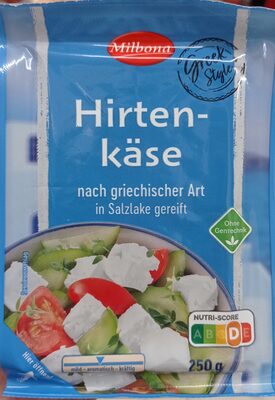
Barcode: 20117221
Hirtenkäse
HALAL
📝 Reason: All ingredients in Hirtenkäse are derived from Halal sources. There are no Haram or Doubtful ingredients present. The product does not contain any alcohol, pork, or Haram E-codes. The microbial rennet used is Halal as it is not derived from animal sources. The product is suitable for consumption under Islamic dietary laws.
📄 Certificates: None
Ingredients:
Details
Hirtenkäse: A Delicious Cheesy Delight
Hirtenkäse, a traditional cheese made from pasteurized cow’s milk, has gained popularity not only for its rich flavor but also for its adaptability in various dishes. But for those adhering to Islamic dietary laws, a crucial question arises: Is Hirtenkäse halal? Let’s dive into its halal status and examine its ingredients closely.
Understanding the Halal Status of Hirtenkäse
According to our research, Hirtenkäse is deemed HALAL. All components of this cheese are sourced from halal sources, ensuring that it does not include any elements that would violate halal dietary guidelines. There are no haram or doubtful ingredients present, making it suitable for Muslim consumers looking for compliant dairy options.
Ingredient Breakdown of Hirtenkäse
The ingredients of Hirtenkäse are as follows:
- Pasteurisierte Kuhmilch (Pasteurized cow’s milk)
- Speisesalz (Table salt)
- Käsereikulturen (Cheese cultures containing milk)
- mikrobielles Lab (Microbial rennet)
Let’s discuss each ingredient to confirm its halal status:
1. Pasteurisierte Kuhmilch
Pasteurized cow’s milk is the primary ingredient in Hirtenkäse. Generally, it is deemed halal, provided it hasn’t been contaminated with any haram substances during production. Being a natural dairy product, it is well accepted within Islamic dietary practices.
2. Speisesalz
Table salt is another core ingredient. As a mineral, it is universally regarded as halal. It does not undergo any processes that could introduce haram elements, making it safe for Muslims to consume.
3. Käsereikulturen (Cheese cultures containing milk)
These cultures play a vital role in cheese production. Made from milk and derived from halal sources, they are considered acceptable under Islamic laws. Cheese cultures contribute to the flavor and texture of the cheese, ensuring that Hirtenkäse not only tastes wonderful but is also halal-friendly.
4. mikrobielles Lab
Microbial rennet is used in the cheese-making process. Unlike traditional rennet derived from animal stomachs, microbial rennet is synthetic, produced by fermentation. It is completely halal as it is not derived from any animal sources. This is a significant factor for those looking for halal dairy options.
How Hirtenkäse Fits into Halal Diets
In summary, Hirtenkäse is a safe choice that aligns well with halal dietary laws. Its ingredients are carefully selected, with all components being halal-approved. It’s crucial for consumers to be informed about what goes into their food, and understanding Hirtenkäse’s halal status offers peace of mind.
Conclusion: Enjoy Hirtenkäse with Confidence!
As we’ve explored, Hirtenkäse is not just a delightful cheese but also a product that respects Islamic dietary laws. Whether included in a cheese platter, melted in enchiladas, or served with bread, you can enjoy Hirtenkäse without any reservations. Remember, the key to a halal diet is awareness—you can savor Hirtenkäse knowing that it complies with your dietary requirements!

